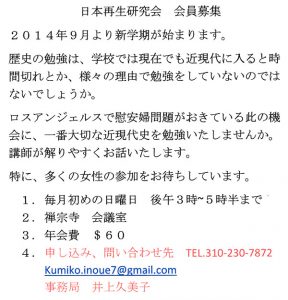Shinzo Abe (安倍晋三) is the 90th (2006-2007), 96th and 97th (2012-now) Prime Minister of Japan. Abe is recognized as one of Japan’s most nationalistic leaders in recent history. As a young legislator, Abe was the secretary general of the Young Diet Member Group for Considering Japan’s Future and History Textbooks (日本の前途と歴史教科書を考える若手議員の会, Nippon no zento to rekishi kyokasho wo kangaeru wakate giin no kai) made up of conservative members of his Liberal Democratic Party.
As the Prime Minister, Abe made a comment in March 2007 denying “forcible recruitment” of comfort women by the Japanese military. His remark was immediately criticized by the U.S. Deputy Secretary of State Negroponte and others, but Abe doubled down on the comment by stating that there is no evidence that point to the forcible recruitment by the Japanese military. His Deputy Cabinet Minister further stated on radio that the women were sold by their parents to become comfort women, insisting that the Japanese military had nothing to do with it.
Emboldened by Abe, Tokyo governor Shintaro Ishihara and other political leaders repeated similar or even more controversial statements throughout the spring, which along with the publication of the devastatingly counter-productive opinion ad The Facts (2007) led to the issuance of the U.S. Congressional Research Service report as well as the passage in July of the U.S. House of Representative resolution H.Res.121, both of which were critical of Japan’s handling of the comfort women issue. Soon after, Abe abruptly resigned his position.
Before becoming the Prime Minister again in December 2012, Abe was among the co-signers to the opinion ad Yes, we remember the facts. (2012), a follow-up to the earlier ad in 2007 that denied historical orthodoxy on comfort women.
Upon returning to power, Abe became more cautious in addressing the issue of comfort women, focusing instead of delegitimizing the historical processes that led to the contemporary understanding of the comfort women issue. For example in June 2014, Abe administration released a report on the process resulting in Kono Statement (1993) intended to cast doubts in the accuracies of the groundbreaking 1993 statement by then-Cabinet Minister Yohei Kono that acknowledged Japanese government’s responsibility in the treatment of comfort women during the WWII, which was seen as the first step to retracting or trivializing it.
In March 2015 Abe expressed “sympathies” toward former comfort women, describing them as the victims of human trafficking, while leaving ambiguous who was responsible for the trafficking of the women. In April of that year, he delivered a speech at the joint session of the U.S. Congress without mentioning comfort women despite demands from some U.S. politicians and civic groups. A week later, a group of 197 mostly American scholars published the “Open Letter in Support of Historians in Japan” demanding Abe to take more concrete actions to address the issue of comfort women.
In December 2015, foreign ministers of Japan and South Korea jointly announced an “agreement” between two countries [Japan-ROK Agreement (2015)] that “permanently resolved” the issue of comfort women with Japan’s payment of 1 billion yens to the foundation set up by South Korean government to provide direct payment to the surviving former comfort women. The agreement was widely criticized by advocates for the comfort women because it did not involve survivors’ voices nor formal acknowledgement of violence by the Japanese military and also by Japan’s far-right fringes that considered any concession as unnecessary.

